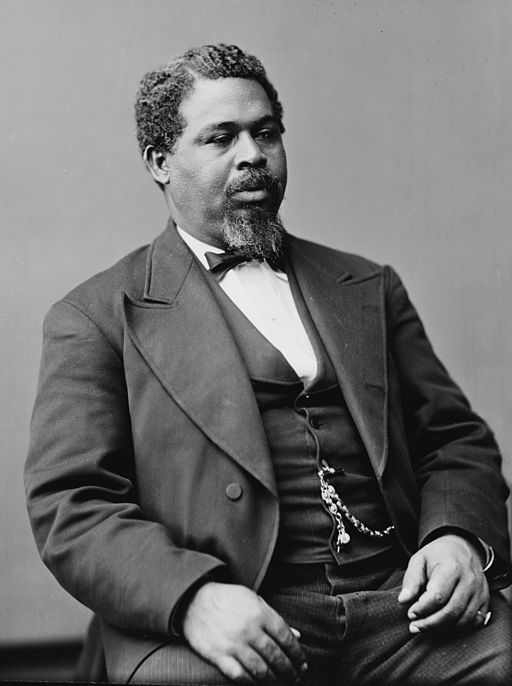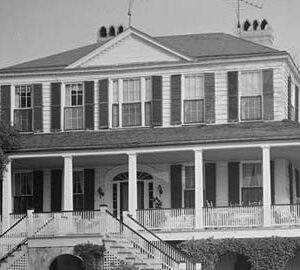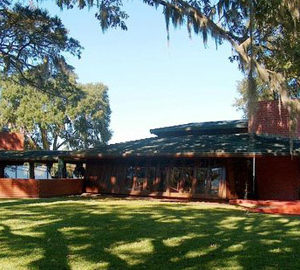Robert Smalls (April 5, 1839 – February 23, 1915) was an American politician, publisher, businessman, and maritime pilot.

Born into slavery in Beaufort, South Carolina, he freed himself, his crew, and their families during the American Civil War by commandeering a Confederate transport ship, CSS Planter, in Charleston harbor, on May 13, 1862, and sailing it from Confederate-controlled waters of the harbor to the U.S. blockade that surrounded it. He then piloted the ship to the Union-controlled enclave in Beaufort–Port Royal–Hilton Head area, where it became a Union warship. His example and persuasion helped convince President Abraham Lincoln to accept African-American soldiers into the Union Army.
After the American Civil War he returned to Beaufort and became a politician, winning election as a Republican to the South Carolina Legislature and the United States House of Representatives during the Reconstruction era. Smalls authored state legislation providing for South Carolina to have the first free and compulsory public school system in the United States. He founded the Republican Party of South Carolina. Smalls was the last Republican to represent South Carolina’s 5th congressional district until the election of Mick Mulvaney in 2011.
Early Life
Robert Smalls was born in 1839 to Lydia Polite, a woman enslaved by Henry McKee. She gave birth to him in a cabin behind McKee’s house, at 511 Prince Street in Beaufort, South Carolina. He grew up in the city under the influence of the Lowcountry Gullah culture of his mother. His mother lived as a servant in the house but grew up in the fields. Robert was favored over other enslaved people, so his mother worried that he might grow up not understanding the plight of enslaved field workers, and asked for him to be made to work in the fields and to witness whipping.
When he was 12, at the request of his mother, Smalls’ master sent him to Charleston to hire out as a laborer for one dollar a week, with the rest of the wage being paid to his master. The youth first worked in a hotel, then became a lamplighter on Charleston’s streets. In his teen years, his love of the sea led him to find work on Charleston’s docks and wharves. Smalls worked as a longshoreman, a rigger, a sail maker, and eventually worked his way up to become a wheelman, more or less a helmsman, though slaves were not permitted that title. As a result, he was very knowledgeable about Charleston harbor.
Family
At age 17, Smalls married Hannah Jones, an enslaved hotel maid, in Charleston on December 24, 1856. She was five years his senior and already had two daughters. Their own first child, Elizabeth Lydia Smalls, was born in February 1858. Three years later they had a son, Robert Jr., who later died at age two. Robert aimed to pay for their freedom by purchasing them outright for $800. Smalls and his family attended Berean Baptist Church when living in Washington, D.C. Smalls was a Prince Hall mason as a member of Sons of Beaufort Lodge #36.
Hannah Smalls died on July 28, 1883. On April 9, 1890, Robert Smalls married Annie E. Wigg, a Charleston schoolteacher, who bore him one son, William Robert Smalls (1892–1970). Annie Smalls died on November 5, 1895.
Smalls died of malaria and diabetes on February 23, 1915, at the age of 75. He was buried in his family’s plot in the churchyard of the Tabernacle Baptist Church in downtown Beaufort. The monument to Smalls in this churchyard reads a statement he made to the South Carolina legislature in 1895: “My race needs no special defense, for the past history of them in this country proves them to be the equal of any people anywhere. All they need is an equal chance in the battle of life.”
“Robert Smalls Pt. 2: Steering the Planter,” to be posted on February 12, continues this series of articles on Robert Smalls.
Source: https://commons.wikimedia.org/.




